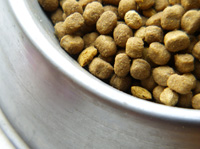Whiskas and Pedigree disappear from Russian pet food market
Many suppliers of foreign-made pet food can not receive a license from Russia’s Federal Service for Veterinary and Phytosanitary Surveillance to import the goods to Russia and are forced to scrap their activities in the country.

At the end of 2008, the Federal Service changed the set of documents, which are required to receive the license for the import of pet food. The service began to decline licenses to many suppliers claiming that enterprises must be included on a special register of the department, similar to what is practiced with foodstuffs for people.
Russia comes second after the United States on the number of pets per capita. Nearly every other Russian family (47-48 percent) keeps pets at home. There are up to 30 million pet cats and up to 20 million pet dogs in Russia.
The market of pet food in Russia started developing almost 20 years ago. It was gaining 20-25 percent every year, i.e. the pet food market was doubling every four or five years. The Russians spend about 4/5 of their income on dry and canned dog and cat food.
The present-day market of pet food in Russia is evaluated at one billion dollars. Imports make over 70 percent of the goods. Germany, Britain, France, China and the USA are included in the top five of the largest exporters of pet food to Russia.
US companies showed a negative reaction to the new rules of the Russian bureaucracy. “They found the special register measure absolutely unnecessary. They now refuse to draw up any lists claiming that it would be ridiculous, because it goes about the civilized, not the handicraft manufacture of pet food,” Tatiana Kolchanova, the general director of the Union of Zoo Business Enterprises said.
Federal Service for Veterinary and Phytosanitary Surveillance has already signed away 32 licenses – 19 of them were explained with the absence of the list of product makers in the USA, Australia and New Zealand.
“We have a certain shortage of goods already. We have lost several positions, but we try to replenish them with European brands. If people feed a certain brand of food to their pets for years, cats or dogs may refuse to eat something different,” a salesperson representing a chain of Moscow pet shops said.
It is worthy of note that the cost of imported pet food has increased 1.5 times in Russia over the decline of the ruble rate against the dollar and the euro.
Subscribe to Pravda.Ru Telegram channel, Facebook, RSS!




